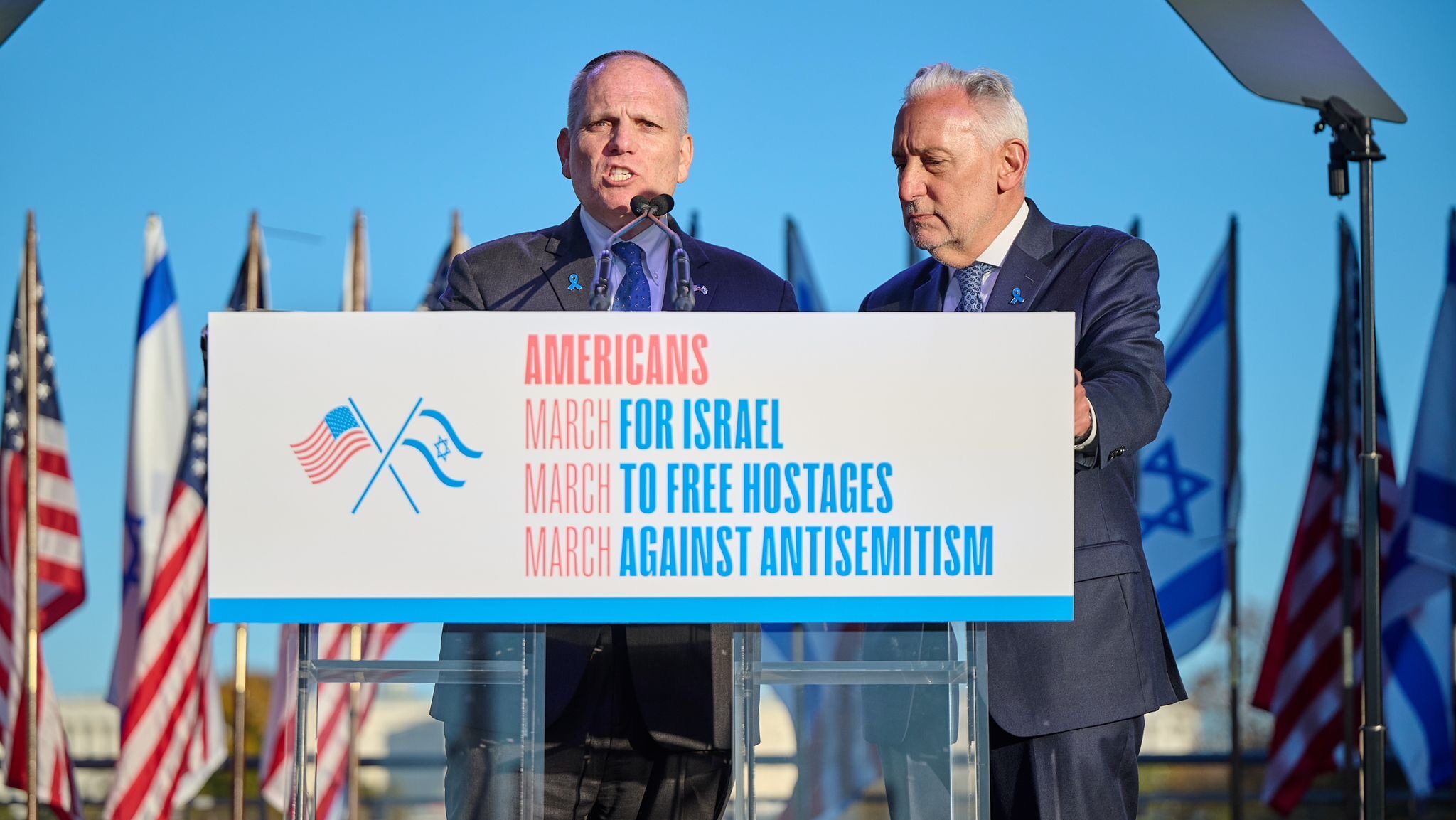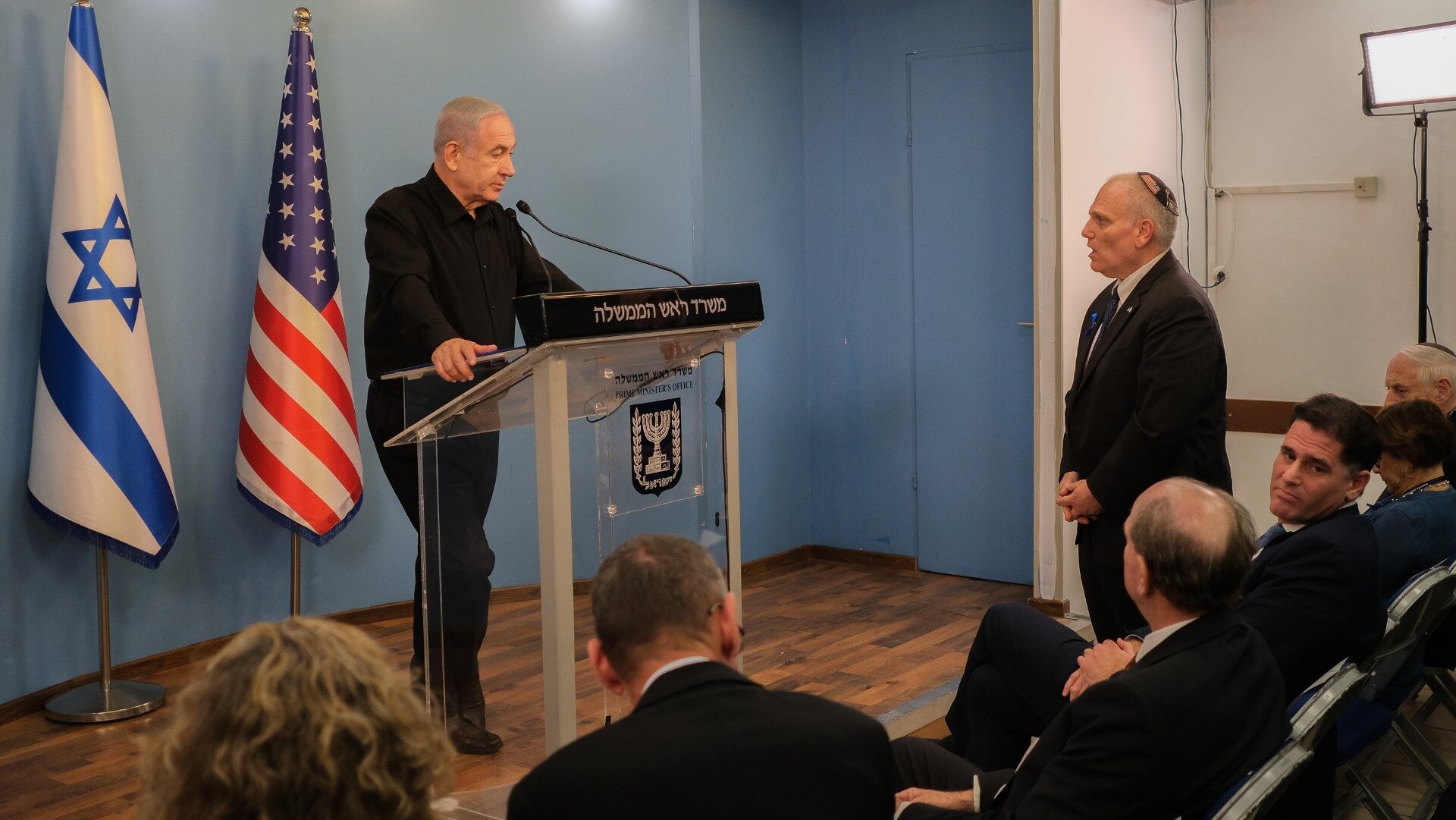Netanyahu Tells Conference of Presidents: Press Qatar To Push Hamas To Release Hostages
Speaking with American Jewish leaders, senior Israeli figures vow to finish off Hamas in the Gaza Strip and characterize the conflict as the frontline in a global battle against the Iranian axis
The Israel-Hamas war is well into its fifth month, and while fighting continues to flare up in parts of the Gaza Strip previously considered under control, Israeli authorities say they believe the end of the campaign is in sight.
“We’ve destroyed three-quarters of Hamas’ fighting battalions,” Israeli Prime Minister Benjamin Netanyahu told a room full of American Jewish leaders in Jerusalem on Sunday, Feb. 18.
Speaking to the Conference of Presidents of Major American Jewish Organizations, Netanyahu reiterated Israel’s three goals for “total victory” in the war against Hamas, saying: “One, destroy Hamas. Second, free all our hostages. And third, ensure that Gaza no longer poses a threat towards Israel.”
He said that Israel would not leave the job half-done, no matter the external pressures.
“We cannot leave a quarter of Hamas’ terrorist battalions intact,” Netanyahu said. “No one would do that in the case of fighting ISIS [the Islamic State terrorist organization]. You wouldn’t leave a quarter of ISIS intact in a defined territory. You wouldn’t even think about that. And you didn’t. America finished the job with its allies. We will finish the job here with our brave soldiers.”
Earlier, former Israel Defense Forces chief of staff, former defense minister and current war cabinet member Benny Gantz told the gathering that the current war is his “fifth or sixth campaign against Hamas.”
“We have tried everything but eliminating it, he said. “We were left with no choice. We must win this war. And for that to happen, we need time. The world must know, and Hamas leaders must know, that if by Ramadan [the Muslim holiday that begins March 10] the hostages are not home, the fighting will continue everywhere, including the Rafah area.”
The meeting was part of the Conference of Presidents’ 49th annual Israel mission. Every Israeli prime minister since Levy Eshkol has addressed the group, which, according to its website, is a conglomerate of organizations that works to advance the interests of American and world Jewry, and sustain broad-based support for Israel.
The conference’s executive vice chairman emeritus, Malcolm Hoenlein, told The Media Line that anything less than Hamas’ total elimination would allow the terror group to claim victory, which would spell disaster for Israel and for the entire region.
“Every Arab leader I speak to says, ‘Decimate them. Don’t listen to what we say, just take care of it. Because it will hurt all of us.’ Everyone. If you care about the Abraham Accords moving forward, if you care about stability in the region, if you care about countering Iran’s domination and desire for dominance in the region, then you have to make sure to support actions of the government of Israel and the military of Israel,” Hoenlein said.
Asked why Arab leaders do not say such things publicly, Hoenlein said they were concerned about talk in the “Arab street.” He said the Palestinian issue is in fact far from the top of the list of priorities for Arab states, but also that these states also have not felt public support from the West in countering Iran’s influence.
“That’s why the presence of the aircraft carriers was such an important statement by the US,” Hoenlein said. “Because it’s how they [Arab states] perceive the commitment to the United States. In the Middle East, people act on perception of reality, not necessarily reality. And we have a situation today where Iran is trying to create an alternative reality.”
Speaking of concerns that Israel is losing international support for its campaign, US Ambassador to Israel Jacob Lew told the conference that American criticisms are solely meant to keep Israel in line with humanitarian needs and shared values.
Netanyahu responded by saying that Israel had taken unprecedented steps to keep civilian casualties down.
He said that in nine months of fighting to defeat Islamic State in Mosul, Iraq, 10,000 people were killed, with the ratio of civilians to combatants killed being more than 4:1. However, in the Gaza war, “we’re now down to a ratio of 1:1,” he said.
Netanyahu said Israel routinely sends warnings ahead of strikes to civilians via text messages, flyers, phone calls, and other measures.
“We’re doing things to prevent this [civilian casualties] that simply cannot be compared to any other arena. [Col.] John Spencer [head of the Urban Warfare Project at the West Point military academy] says, ‘What other army gives advance notice of where it’s going to attack?’” Netanyahu said.
World War III and the Battle for Civilization
Many senior officials say that while Israel’s war with Hamas may seem local, it has far-reaching implications.
“October 7 was the first official day of World War III,” Ken Abramowitz, the chairman of American Friends of Likud, told The Media Line. “Israel knows that, but no one else does. … So Israel is basically saving Western civilization by itself, with a lot of aid from America and Europe. Iran has about 500,000 terrorists worldwide, about 35,000 of whom are in Gaza. So Israel is focusing on the terrorists in Gaza. But there are 500,000 worldwide. This is a job way beyond the abilities of Israel. So it’s time for America and Europe to step up.”
Netanyahu also characterized the war as “the battle of civilization against barbarism. Because if Hamas gets away with this, if the axis of evil and terror that Iran dominates in this world, or seeks to dominate in the Middle East, [prevails,] it will expand everywhere.”
As well as pointing to Iran as a source of conflict, Netanyahu and conference members also spoke of Qatar, especially in the context of a deal to release the 134 remaining Israeli hostages. Over 30 of them are known to have died and their bodies are being held by Hamas.
“Our formula is very simple,” Netanyahu said. “The release of hostages can be achieved through strong military action and very tough negotiations. That tough position has to involve the exertion of pressure. And the exertion of pressure is not merely on Hamas itself, but on those who can exert pressure on Hamas, beginning with Qatar. Qatar can press Hamas as no one else can. They host Hamas’ leaders. Hamas is dependent on them financially. And I urge you to press Qatar to press Hamas. Because we want our hostages released.”
He suggested that he would be open to a new temporary cease-fire and hostage release deal.
“But deal or no deal, we have to finish the job to get total victory,” he said.
Fighting Antisemitism
American officials such as House Speaker Nancy Pelosi have claimed that there is foreign influence in the sharp rise in antisemitism and anti-Israel demonstrations since the war began.
“Qatar has to be held to account, like others, and especially be subject to sanctions like others, with what they’ve done in the US,” Hoenlein told The Media Line. “They [Qatar] have spent hundreds of billions of dollars buying businesses, properties, real estate … but also the fact that this limited amount of money is going to universities and influencing the course of it [education], that [universities have] become hostile places for Jewish students and pro-Israel students who are not Jewish. And now we see even more from faculty members who find the climate on their campuses is intolerable for them.”

William Daroff at the pro-Israel march on November 14, 2023. (Courtesy)
The Conference of Presidents has been highly active in organizing pro-Israel rallies and in pushing for the broad adoption of the International Holocaust Remembrance Alliance’s working definition of antisemitism.
The conference and the Jewish Federations of North America came together to organize the pro-Israel march in Washington DC on Nov. 14, which was one of, if not the, largest pro-Israel demonstrations in American history.
“We were able to bring together nearly 300,000 Jews and non-Jews alike to come to Washington to stand with Israel and against antisemitism and demand the release of the hostages,” conference CEO William Daroff told The Media Line. “And among the reasons we decided to put it on was because we saw these demonstrations of pro-Hamas hooligans who were marching on college campuses, who were marching in New York and Washington and around the country, and we recognized that this wasn’t where America stands.”

March for Israel, November 14, 2023, Washington, DC (Perry Bindelglass)
Conference chairperson Harriet Schleifer told The Media Line, “I think that today, a lot of the conversation and criticisms we hear of Israel are because people are uninformed or misinformed. And our role is to educate and make sure we’re speaking the same language, so we know how to identify and rectify the problem.”
The Qatari Conundrum
Asked about US pressure on Qatar, Ambassador Lew took a diplomatic approach, saying that the relationship between the two countries is complicated because of the US military base in Qatar.
On the question of why the United States decided to renew its military base in Qatar despite Qatari support for Hamas and interference in the US, Lew said, “That would not have been a way of gaining pressure on Qatar, because you can’t just remove a military base overnight. And it’s not as if Israel would be safer if the US didn’t have a military base in Qatar. So without defending actions that Qatar might be responsible for that would be objectionable, we have to look, in a pragmatic way, at what the relationship is producing … particularly right now. And right now, first and foremost [our priority] is saving the lives of the remaining hostages. And Qatar is central to that.”
‘No Palestinian State for Now’
Speaking of “the day after” the war, Netanyahu emphasized that “the day after Hamas is the day after Hamas is destroyed, with emphasis on ‘after.’ After Hamas is removed from the scene.”
He and other cabinet members have discussed temporary but indefinite Israeli control of Gaza until the time comes when an independent and non-threatening entity could take over.
Gantz discussed a four-stage, long-term plan to prime the Palestinian territories for a peaceful future beside Israel.
The first step is “obviously, a military victory, removing the threat posed by Hamas and Hizbullah,” Gantz said. Second is the return of the hostages. Third is replacing Hamas ideology with “a deep change in the Palestinian education system [through] the uncompromising removal of content preaching terror and hate for Israel,” he said.
“The day that the textbooks in Gaza and Judea and Samaria will look like those of our Emirati friends will be the day we share a brighter future in the Middle East,” Gantz said.
Part of the third step would include restructuring Gaza’s governance with an entity that “cannot be Hamas and should not be Israel.” Rather, Gantz suggested that it be made up of Palestinians unaffiliated to terrorist groups and who most likely would win popularity through their humanitarian efforts.
“In the near future, in Gaza, it’s not a question of who controls in terms of security. That will be us … especially operationally speaking,” Gantz said. “It’s going to be about who controls the food, the water, and the medicine. And if you leave it in the hands of Hamas, or in the hands of UNRWA, which actually works under Hamas, you are strengthening Hamas’ governance capacity, or maintaining them.”
The fourth part of Gantz’s plan is for Israel to maintain its resilience and unity.
Meanwhile, Western powers have maintained a desire to see Palestinian independence, although many heads of state have stopped short of calling for a two-state solution immediately.
Lew told the conference that the US would not take unilateral steps towards endorsing a Palestinian state, which Israeli and Jewish leaders would in any case reject out of hand, particularly as they say the conditions for peace have not yet been met.
Daroff told The Media Line that polls of Palestinians showed that “well over 80% in the West Bank, and a bit fewer in Gaza for obvious reasons, support October 7 and the idea that Hamas massacred and brutalized the Israeli people. This is not a time when the Palestinian or Israeli people are ready for this [a Palestinian state now]. And I think there will be a time, God willing. But it’s not now.”
Netanyahu said that after the horrors of Oct. 7, Israel could not agree to international calls to unilaterally recognize a Palestinian state.
Earlier that day, Netanyahu read aloud a resolution that passed unanimously in the government.
“Israel utterly rejects international diktats regarding a permanent settlement with the Palestinians,” it said. “A settlement, if it is to be reached, will come about solely through direct negotiations between the parties without pre-conditions. Israel will continue to oppose unilateral recognition of a Palestinian state. Such a recognition in the wake of the Oct. 7 massacre would be a massive and unprecedented reward to terrorism and would prevent any future peace agreement.”


